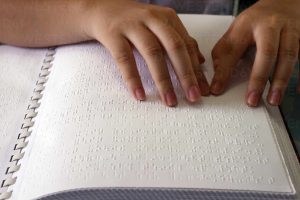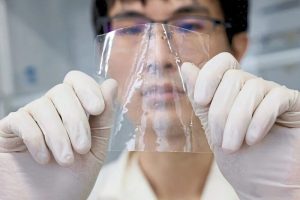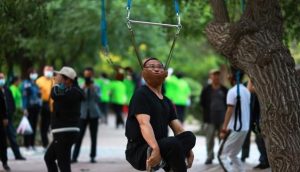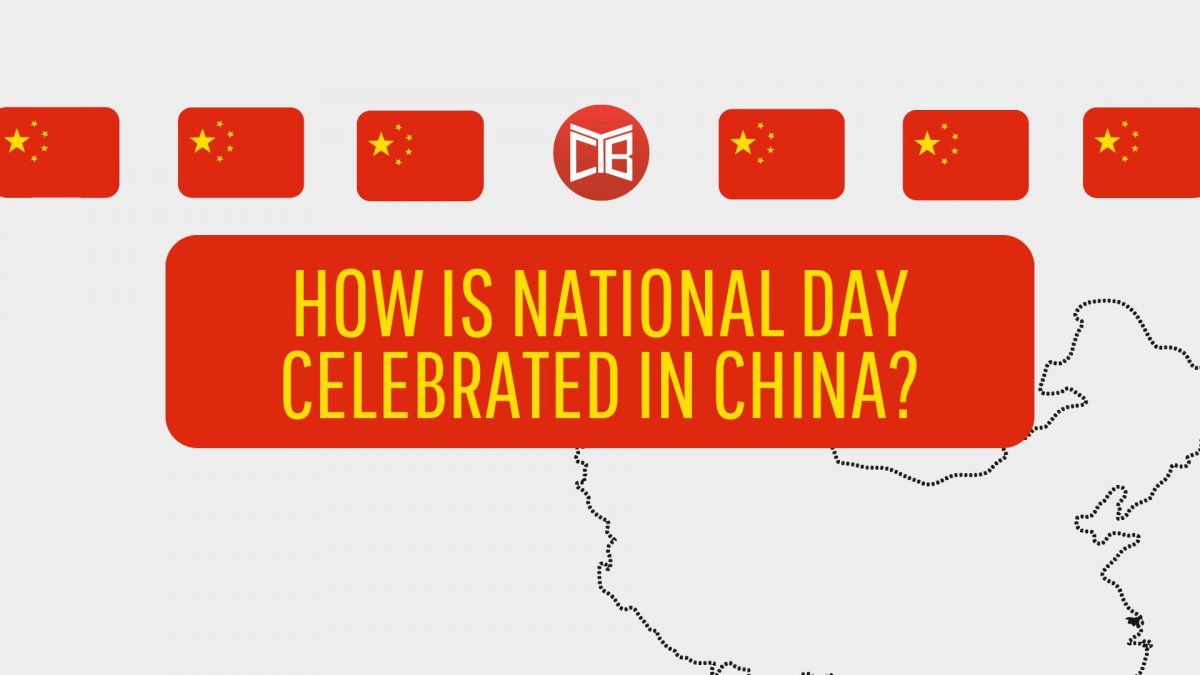
What is National Day in China?
National Day in China, known as 国庆节 (Guóqìngjié) in Chinese, is celebrated annually on 1st October. National Day commemorates the founding of the People’s Republic of China on 1st October 1949. It is a major national holiday and the start of one of China’s two annual Golden Weeks. During the National Day Golden Week, which runs from 1st October to 7th October, people across the country enjoy a seven-day break from work. This time is typically spent celebrating, traveling, and spending quality time with family and friends. National Day itself is celebrated with various festivities including parades, fireworks and evening galas.
When is National Day in China?
National Day is celebrated on 1st October each year in China. National Day forms part of the National Day Golden Week that runs from 1st October to 7th October.
Is National Day a public holiday in China?
Yes, National Day is a public holiday in China. It forms part of the seven-day National Day Golden Week holiday allowing people an extended break from work. However, to compensate for the time off, China implements adjusted working days. This means that employees are often required to work on weekends before or after the Golden Week to make up for the lost workdays, typically adding two or three weekend working days. Adjusted working days are a practice that is unique to China and are generally accepted as a part of working life.
What is Golden Week in China?
Golden Week in China refers to two major national holidays that create extended periods of rest from work. The two annual Golden Weeks were established to provide a much-needed boost to domestic travel and consumption. It is common for people in China to move to major cities to find employment, often away from their children. Therefore, the two annual Golden Weeks provide an opportunity for families to reconnect, travel and spend time together.
The two annual Golden Weeks in China
- Chinese New Year Golden Week. Also known as Spring Festival, usually late January or February. The seven-day work break begins on Chinese New Year, allowing people to travel back to their hometowns for the festivities.
- National Day Golden Week. 1st to 7th October each year. Many people use the National Day holiday to travel domestically or internationally and it provides a significant boost to the tourism industry.
Are there two or three Golden Weeks each year in China?
There are two Golden Weeks in China each year: Chinese New Year Golden Week and National Day Golden Week. However, there used to be a third Golden Week, namely May Day Golden Week (1st – 7th May). This was introduced in 2000 to boost domestic consumption and travel, but it reverted to being a single May Day holiday in 2008. The Chinese government then redistributed the days off to allow for celebrations of other key traditional festivals such as Qingming Festival, Dragon Boat Festival and Mid-Autumn Festival.
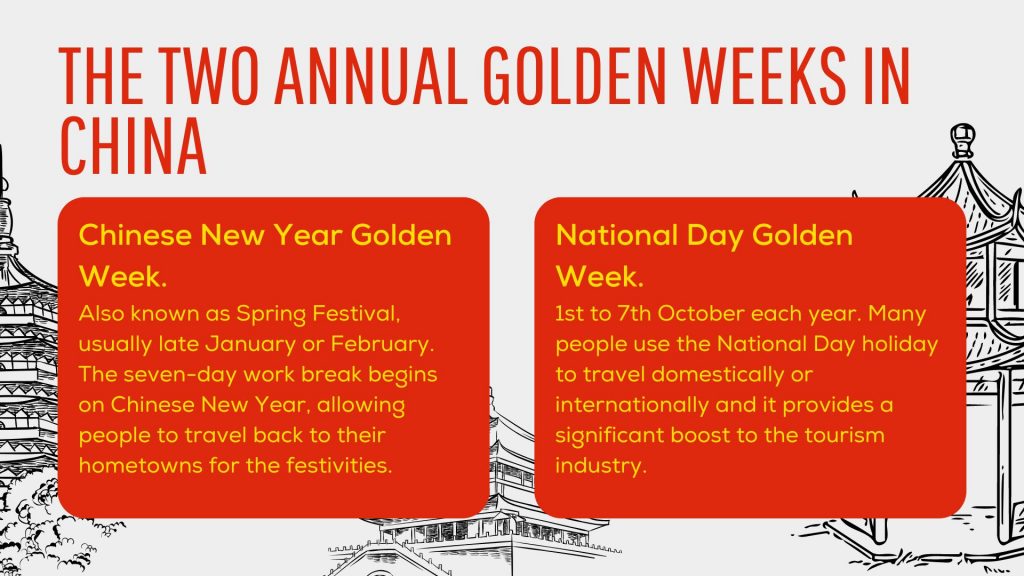
The history of National Day in China
Chairman Mao declared the founding of the People’s Republic of China in Tiananmen Square on 1st October 1949 in front of a crowd of over 200,000 people. The crowd stood to attention as the new flag of China was hoisted and the new national anthem played, ‘The March of the Volunteers’. In December of the same year, the Chinese government passed measures for national holidays and stipulated that National Day should be a national holiday for the entire population over 1st and 2nd October. Each year since 1949, National Day has been celebrated in China.
How is National Day celebrated in China?
National Day is celebrated with great enthusiasm across China, as people make the most of the extended seven-day break from work. Both official and unofficial celebrations are customary, such as:
Travel and family time
National Day Golden Week is the biggest week for domestic and international travel in China. Each year, over 700 million passengers make trips during National Day Golden Week and there are over 17,000 daily outbound international flights. This leads to the price of many tickets and trips increasing significantly during the National Day period, which can lead to travel frustration for many people.
Flag-raising ceremony at Tiananmen Square
National Day begins with a flag-raising ceremony at Tiananmen Square, which begins at sunrise. As the flag is raised, the national anthem is played and many crowds of people turn out each year to witness the flag-raising ceremony.
National Day parade
National Day parades are held once every 10 years to commemorate National Day. The parades showcase military strength and technological advancements, however there is also a civilian parade later in the day with colorful floats and performances. Formerly National Day parades were held each year, until the golden jubilee anniversary in 1999, when it was decided to hold the large parades each 10th year.
Changing of the Portrait of Chairman Mao
The portrait of Chairman Mao has been changed at Tiananmen Gate Tower each year during National Day celebrations since 1949. Ge Xiaoguang has been the artist since original painter Wang Guodong retired in 1977. It takes up to 50 days of intensive work each year for Ge to complete the work!
Evening Gala event
For significant milestones, such as the 70th anniversary event in 2019, a large Evening Gala event is held that is broadcast on state television. The Evening Gala in 2019 saw almost 7,000 performers in the grounds of Tiananmen Square, awaiting their turn to showcase their talents!
Decorations and fireworks
Each National Day, red lanterns and banner scrolls are hung around China in public spaces, workplaces and homes. Balloons and sculptures also decorate many public spaces. As night falls, fireworks are set off to brighten the nighttime sky.
What do people eat on National Day in China?
Unlike other important holidays in China, there are no official foods associated with National Day. However, during recent years a new trend of eating ‘birthday noodles’ for National Day has emerged. Noodles are a symbol of longevity in Chinese culture and are often eaten on birthdays to promote a long and prosperous life. As National Day celebrations are held to mark the ‘birthday’ of modern China, the trend of eating ‘birthday noodles’ during National Day Golden Week has started to take hold.
Key Chinese vocabulary for National Day
- 国庆节 (Guóqìngjié) – National Day
- 十月一日 (shí yuè yī rì) – October 1st (often shortened to just 十一 in reference to National Day)
- 黄金周 (huánɡjīn zhōu) – Golden Week
- 国庆节快乐! (Guóqìng jié kuàilè) – Happy National Day!
- 升旗仪式 (shēngqí yíshì) – flag-raising ceremony
- 天安门广场 (Tiān’ānmén Guǎngchǎng) – Tiananmen Square
- 烟火 (yānhuǒ) – fireworks
- 阅兵 (yuèbīng) – military parade
- 国旗 (guóqí) – national flag
- 家庭团聚 (iātíng tuánjù) – family reunion
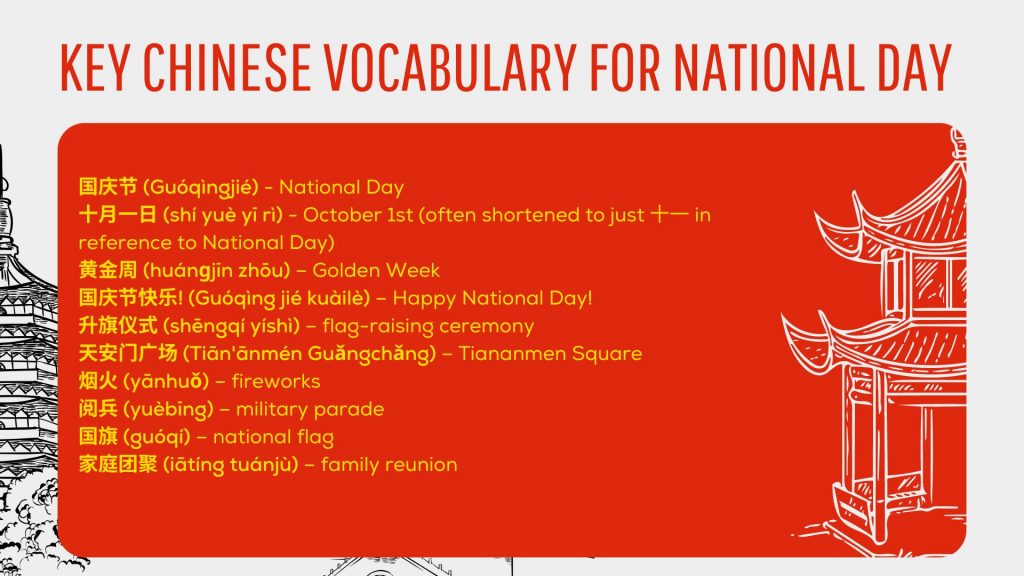
FAQ
- What is National Day in China? National Day in China, known as 国庆节 (Guóqìng Jié) in Chinese, is celebrated annually on 1st October. National Day commemorates the founding of the People’s Republic of China on 1st October 1949.
- When is National Day in China? National Day is celebrated on 1st October each year in China.
- Is National Day a public holiday in China? National Day is a public holiday that forms part of the National Day Golden Week holiday that runs from 1st to 7th October each year.
- What is Golden Week in China? Golden Week in China refers to two major national holidays that create extended periods of rest from work. The first is Chinese New Year Golden Week (beginning on Chinese New Year’s Eve) and the second is National Day Golden Week (1st to 7th October).
- How many Golden Weeks are there each year in China? There are two Golden Weeks each year in China. However, between 2000 and 2008 there were three Golden Weeks in China that also included May Day Golden Week.
Author
Sean studied Chinese and Spanish at University of Leeds and founded The Chairman’s Bao alongside Tom Reid in his final year of study in 2015. Current Managing Director of The Chairman’s Bao, he has overseen the company’s growth from university bedroom concept to an international force in the EdTech industry with over 200,000 individual users and over 400 global partner institutions. Sean also launched Newsdle alongside Tom Reid and Oliver Leach in 2021, for students and teachers of Spanish and French. In his spare time, Sean is still a keen language learner and runner. He also sits on the Board of charity Leeds Irish Health and Homes in the UK.










